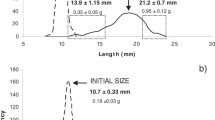Abstract
Tilapia esculenta is abundant in Lake Victoria, and is the most important food fish in this area. It has been stated1 that this fish feeds on phytoplankton. However, further investigations were undertaken, and the contents of stomach and rectum of the same specimen were examined and compared in a large number of fish taken at weekly intervals during the whole of 1950. A consideration of these results has led to the conclusion that only the diatom members of the phytoplankton are digested, whereas the Blue-Green and Green Algæ pass undigested through the gut.
This is a preview of subscription content, access via your institution
Access options
Subscribe to this journal
Receive 51 print issues and online access
$199.00 per year
only $3.90 per issue
Buy this article
- Purchase on Springer Link
- Instant access to full article PDF
Prices may be subject to local taxes which are calculated during checkout
Similar content being viewed by others
References
Worthington, E. B., “A Report on the Fisheries of Uganda” (Crown Agents for the Colonies, London, 1932). Graham, M., “A Report on the Fishing Survey of Lake Victoria, 1927–1928”. (Crown Agents for the Colonies, London, 1929).
Author information
Authors and Affiliations
Rights and permissions
About this article
Cite this article
Fish, G. Digestion in Tilapia esculenta. Nature 167, 900–901 (1951). https://doi.org/10.1038/167900a0
Issue Date:
DOI: https://doi.org/10.1038/167900a0
This article is cited by
-
The food habits of an herbivorous fish (Oreochromis niloticus Linn.) in Lake Awasa, Ethiopia
Hydrobiologia (1989)
-
Grazing responses of tropical freshwater fishes to different scales of variation in their food
Environmental Biology of Fishes (1983)
-
The food of Ancylus fluviatilis (M�ll.), a littoral stone-dwelling, herbivore
Oecologia (1973)
-
Effects of feeding rate on conversion efficiency and chemical composition of the fish Tilapia mossambica
Marine Biology (1972)
-
Studies on the effect of feeding some freshwater fishes with Scenedesmus obliquus (Turpin) Kuetzing
Hydrobiologia (1966)
Comments
By submitting a comment you agree to abide by our Terms and Community Guidelines. If you find something abusive or that does not comply with our terms or guidelines please flag it as inappropriate.



